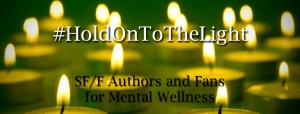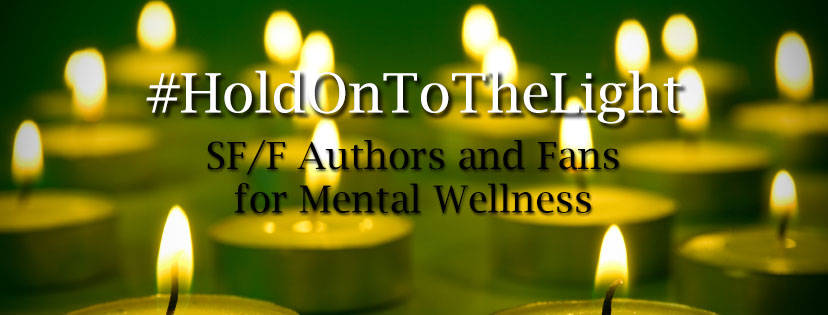
By Laurena Aker
(The Always Keep Fighting—AKF—campaign inspired the #HoldOnToTheLight campaign. Here’s the story behind AKF.)
In May of 2015, Jared Padalecki, one of the lead actors on the long-running television show Supernatural, tweeted the following message to his fans:
“I am in desperate and urgent need of my family. I am so sorry to tell you this but I must head home. I need all of the love I can get right now. Please please give me a few seconds of your time and write me.”
This public plea for help understandably alarmed Jared’s followers worldwide. Two years later in his courageous chapter in the book Family Don’t End With Blood, Jared admitted that he had hit rock bottom during a convention tour in Europe, and alone and exhausted, contemplated suicide just hours before writing that message. His chapter compassionately explains that once before when he had been crushed by feelings that “something” was wrong, he was diagnosed with clinical depression but despite naming the beast, he still didn’t fully comprehend the power his internal monster had over him. Motivated by his responsibilities and passionate work ethic, he pushed down or rationalized the desperation his mind, body and spirit were trying to communicate to him until it finally, unexpectedly overpowered him.
Jared’s confessions about his struggle with depression were not a surprise to his fans, affectionately referred to as the “Supernatural Family”. Early in 2015, Jared launched his first “Always Keep Fighting” fundraising campaign in response to losing a dear friend to suicide on New Year’s Eve. During the campaign, Jared revealed his personal fight with anxiety and despair. He encouraged people to reject the shame associated with mental illness and to seek help to “always keep fighting” against the ravages of self-doubt and depression. Jared’s messages hit home with the fandom. The #AKF campaign sold a record number of tee shirts and raised thousands of dollars for mental illness charities. Fans even bought #AKF merchandise for people who couldn’t afford to buy items for themselves. The resonance of the campaign stunned both the actor and the fans. Jared, a fan idol and the person who brought to life a character of strength and hope on his television show, admitted a personal vulnerability to his fans and was not only fighting with them but for them. Emboldened by his example and trusting the safety of the fandom space, people who had previously hidden or ignored their own confused or unidentified pain came forward on social media and websites, to their friends and to their families. Pleas for help were immediately met with an outpouring of love and practical, real-life assistance including support groups and personal outreach intervention. #AKF became a shorthand for defying being alone or ever being defeated, and providing the strength of compassionate understanding and comradery. It was emblazoned in tattoos, art, wristbands and tea lights. It was even immortalized on the side of a building in a Supernatural episode.
Seven more #AKF campaigns followed the first, each with a different message of self-awareness and mental health. The gravity of the underlying sentiments was always emphasized but the campaigns evoked fun, Supernatural themes to lighten the delivery. Over the next 18 months, subsequent campaigns added “Love Yourself First”, “I Am Enough” and “Family Always Has Your Back” to the mottos taken to heart by the Supernatural Family. In February, 2016, a parallel but related “You Are Not Alone” campaign was launched by Supernatural co-stars Jensen Ackles and Misha Collins to take their concern for the wellbeing of their fans one step further. Partnering with Misha’s charity Random Acts and two other charitable groups, the pair established the “SPNFamily Crisis Support Network”, an online army of trained volunteers who could intervene in moments of crisis and help fans cope with depression, self-injury or addiction.
“Always Keep Fighting” had started out as a fundraising t-shirt sale but it turned into an attitude engrained in the Supernatural Family’s identity. Obviously, the movement touched a massive, latent need for support of those affected by mental illnesses. The Supernatural fandom was an ideal place to launch this global dialog and microcosm of community empathy. The fandom already saw itself as a “family” based on the prevalent family themes within the show. Episodic adages such as “Have your back” and “Family don’t end with blood” reinforced this notion of family. The show’s multi-decade run also created stability, and a perceived importance and responsibility within its fandom relationships. Children grew into adults and adults passed through multiple life stages accompanied by the familiar characters of the show and the friendships and frameworks within the fandom. The actors’ and fans’ year-around interactions with each other at conventions contributed to the real life tangibility of these relationships. The show’s core lessons of hope, resilience and prevailing against insurmountable odds had also permeated the fandom’s psyche – all ideals that fed the #AKF mindset.
From people’s own admissions, the Always Keep Fighting movement saved countless lives. Websites and social media accounts such as Carry-On Supernatural and Supernatural Survivors; and charities such as Random Acts, To Write Love on Her Arms, and IMAlive continue to spread Jared’s, Jensen’s and Misha’s messages of hope and survival. Hopefully, #AKF’s beacon of light helps shatter the stigma of secrecy and shame surrounding mental illness.
Laurena Aker is an independent author and editor. Since 2014 she has been the Managing Editor for The Winchester Family Business, the largest review website for the TV show Supernatural. Her first book, Fan Phenomena: The Twilight Saga (2016) is a fun, informative combination of behind-the-scenes interviews and expert analysis of Twilight’s decade-long impact on literature, music, the entertainment industry and opportunities for women. Her Supernatural publications include a chapter in the best-selling book Family Don’t End With Blood, over 200 feature articles, weekly reviews for TV Fanatic, and the paper “Sparking and Sustaining Superfandoms: Similarities in The Twilight Saga and Supernatural Success Stories”. Prior to embarking on her writing career, Laurena was a Principal with Accenture, a leading global management and technology consulting firm.
The Winchester Family Business’ #AKF Related Articles: https://www.thewinchesterfamilybusiness.com/wfb-tags-list/always-keep-fighting
Supernaturalwiki history of AKF: http://www.supernaturalwiki.com/Always_Keep_Fighting
Supernaturalwiki history of YANA: http://www.supernaturalwiki.com/SPNFamily_Crisis_Support_Network
Family Don’t End with Blood: https://fangasmthebook.com/
#HoldOnToTheLight is a blog campaign encompassing blog posts by fantasy and science fiction authors around the world in an effort to raise awareness around treatment for depression, suicide prevention, domestic violence intervention, PTSD initiatives, bullying prevention and other mental health-related issues. We believe fandom should be supportive, welcoming and inclusive, in the long tradition of fandom taking care of its own. We encourage readers and fans to seek the help they or their loved ones need without shame or embarrassment.
Please consider donating to or volunteering for organizations dedicated to treatment and prevention such as: American Foundation for Suicide Prevention, Hope for the Warriors (PTSD), National Alliance on Mental Illness (NAMI), Canadian Mental Health Association, MIND (UK), SANE (UK), BeyondBlue (Australia), To Write Love On Her Arms (TWLOHA) and the National Suicide Prevention Hotline.
To find out more about #HoldOnToTheLight, find a list of participating authors and blog posts, or reach a media contact, go to http://www.HoldOnToTheLight.com and join us on Facebook https://www.facebook.com/WeHoldOnToTheLight

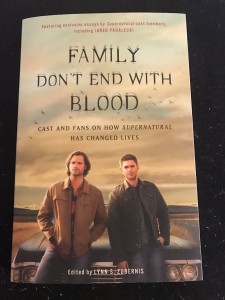 I knew I was in trouble when I choked up on the introduction. Trust me when I say I’m not a big crier. I was teary before I was even into the first essay. Not sad tears, but that sense you get when you come home and know it.
I knew I was in trouble when I choked up on the introduction. Trust me when I say I’m not a big crier. I was teary before I was even into the first essay. Not sad tears, but that sense you get when you come home and know it.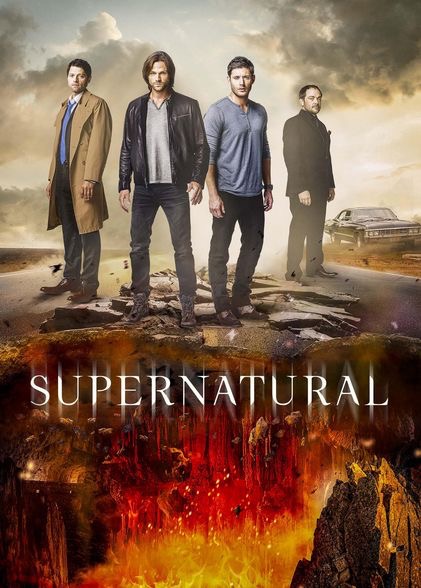
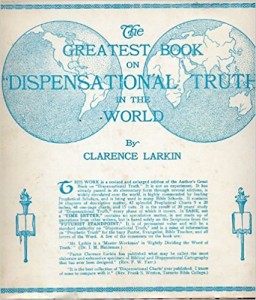 One of my favorite books as a child and pre-teen was Clarence Larkin’s The Greatest Book of Dispensational Truth. It was–I kid you not–an illustrated, fold-out guide to the Apocalypse that did not consider itself to be fiction. If you wonder where Supernatural got its horsemen, Leviathans, the Witnesses, the Seals, the Whore of Babylon, the Beast, the AntiChrist and so much more–it’s all in there, in pictures. Larkin and John Nelson Darby popularized the Rapture and Armageddon mythos by reading several prophetic books of the Bible (Ezekiel, Daniel and Revelation as well as the apocryphal book of Enoch–yes, it’s where Enochian comes from) and interpreting them outside of generally accepted methods of textual criticism and archeological/cultural study. In other words, they in a sense wrote fan fiction of the Bible, and it stuck.
One of my favorite books as a child and pre-teen was Clarence Larkin’s The Greatest Book of Dispensational Truth. It was–I kid you not–an illustrated, fold-out guide to the Apocalypse that did not consider itself to be fiction. If you wonder where Supernatural got its horsemen, Leviathans, the Witnesses, the Seals, the Whore of Babylon, the Beast, the AntiChrist and so much more–it’s all in there, in pictures. Larkin and John Nelson Darby popularized the Rapture and Armageddon mythos by reading several prophetic books of the Bible (Ezekiel, Daniel and Revelation as well as the apocryphal book of Enoch–yes, it’s where Enochian comes from) and interpreting them outside of generally accepted methods of textual criticism and archeological/cultural study. In other words, they in a sense wrote fan fiction of the Bible, and it stuck. So I grew up with people who stockpiled ammo and hid guns in the walls of their houses, who had bunkers and safe houses, who talked about keeping a stash of silver coins on hand so that when–not if–the banks collapsed and currency lost its value, we could run and go to ground. I grew up with caches of freeze-dried food–enough to last five years–and survivalist tactics and friends who trained their kids to strip a gun blindfolded. My uncle and his friends saw themselves as the thin gray line of sentries in a war against evil, willing to die for a cause kept secret because others would think it was crazy.
So I grew up with people who stockpiled ammo and hid guns in the walls of their houses, who had bunkers and safe houses, who talked about keeping a stash of silver coins on hand so that when–not if–the banks collapsed and currency lost its value, we could run and go to ground. I grew up with caches of freeze-dried food–enough to last five years–and survivalist tactics and friends who trained their kids to strip a gun blindfolded. My uncle and his friends saw themselves as the thin gray line of sentries in a war against evil, willing to die for a cause kept secret because others would think it was crazy.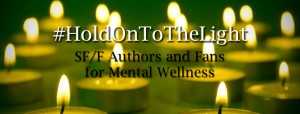
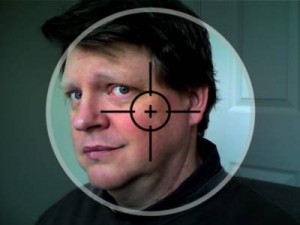 About the author: Dr. Charles E. Gannon is a Distinguished Professor of English at St. Bonaventure University, where he was the Director of Graduate English until he became a full-time author in 2007. A Fulbright Senior Specialist in American Literature and Culture from 2004 to 2009, his most recent non-fiction book is “Rumors of War and Infernal Machines: Technomilitary Agenda Setting in American and British Speculative Fiction.” Now in second edition, it won the 2006 American Library Association Award for Outstanding Book, and was the topic of discussion when he was interviewed by NPR (Morning Edition).
About the author: Dr. Charles E. Gannon is a Distinguished Professor of English at St. Bonaventure University, where he was the Director of Graduate English until he became a full-time author in 2007. A Fulbright Senior Specialist in American Literature and Culture from 2004 to 2009, his most recent non-fiction book is “Rumors of War and Infernal Machines: Technomilitary Agenda Setting in American and British Speculative Fiction.” Now in second edition, it won the 2006 American Library Association Award for Outstanding Book, and was the topic of discussion when he was interviewed by NPR (Morning Edition). About the author:
About the author: Make no mistake, depression is something people do battle with every day. Let’s be a part of their support, not a part of the problem.
Make no mistake, depression is something people do battle with every day. Let’s be a part of their support, not a part of the problem.